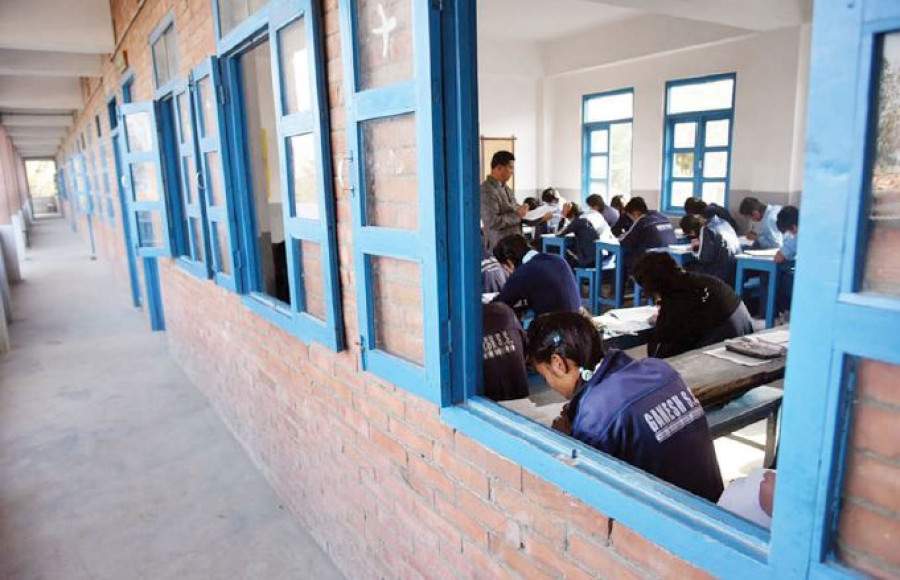National
Students fear coronavirus more than their exams
Officials have promised utmost precautions at test centres to stop the spread of Covid-19, but students are not convinced about their safety.
Binod Ghimire
Abhilekh Belbase, a twelfth grader from Kathmandu Model School, Bagbazar is preparing to take his final high school examination to be administered by the National Examination Board next month.
A permanent resident of Butwal, Belbase doesn’t have to travel to Kathmandu for the test because the board has arranged for him to sit the examination at a centre in his hometown. However, Belbase together with dozens of other examinees, will have to congregate in one centre for their examinations. While he is happy that the test is being held, seven months behind schedule, he is afraid of contracting the virus in the crowd of examinees.
“The ever-increasing threat of coronavirus won’t allow me to take the test with a free mind,” he said. “I don’t understand what the problem is in conducting the test online if the entire teaching-learning process can be done virtually.”
The exams, which were scheduled to begin on May 3, were postponed owing to the pandemic. The board published the schedule for in-person tests starting November 20 after the clearance from the Ministry of Education to hold the examination. But there are changes in the format.
The examinees will take a written examination for 40 percent of the total weightage, additional 40 percent evaluation would be done based on their performance in grade 11 and the remaining 20 percent based on an internal evaluation by the respective schools.
The board normally conducts the tests in May and publishes the results by October. The Cabinet on October 5 allowed all the boards, academic institutions, universities and other institutions to hold their examinations. Following the Cabinet decision, boards and universities have started conducting tests due for the last several months though there are no signs that the threat of the pandemic will subside.
Jung Bahadur Aryal, spokesperson for the board, said they had to opt for an in-person test to maintain its credibility. “A majority of the stakeholders we consulted with suggested holding the examination in the traditional format,” he said. “We have tried to lessen the burden on students by decreasing the weightage of the written test.”
Instead of the usual three-hour tests, the students will do written examinations for just one and a half hours. Aryal said they have adopted measures for the safety of students. Students won’t have to travel to the place of their admission, proper social distancing and safety measures will be adopted and there will be separate tests, later, for those infected with Covid-19.
Despite this promise of utmost precaution, students seem unconvinced. Prakriti Bhattarai, a grade 12 examinee from Everest School, Butwal, says gathering students in one centre will definitely expose them to the virus threat. Around 431,000 students have registered for the examinations this year.
University examinations will also be taking place soon.
Tribhuvan University, Nepal’s oldest and largest varsity, had decided to conduct the tests in the usual format even before the Cabinet cleared its way. Pushpa Raj Joshi, examination controller at the university, said the Cabinet decision comes as an approval of their plan.
“Covid-19 is not going to go soon. We have to adjust with it, taking necessary precautions,” said Joshi. “We will start conducting tests from November third week.”
The Office of the Controller of Examinations of the university is prepared to allow students to take their exams from an affiliated college nearest to them. For instance, a student enrolled in a college in Kathmandu or other cities can take his/her exams from a college in their hometown. Over 415,000 students are currently enrolled in various courses offered by the university.
Joshi said they have already prepared software to register students from the districts where they are currently living. The oldest university has around 1,100 constituent and affiliated colleges, at least one in each district.
Joshi said they will set up more centres to hold the tests beginning with the final year and final semesters of the bachelor and master levels.
Experts on public health say this is a wrong time to hold in-person tests. Dr GD Thakur, former director general of the Department of Health, said the patient load is doubling every week and there is already a shortage of hospital beds. “What if students get infected en masse?” he said. “Academic institutions should opt for online tests.”
As many as 3,517 new cases were reported on Friday, taking the Covid-19 tally to 168,235.




 16.12°C Kathmandu
16.12°C Kathmandu














